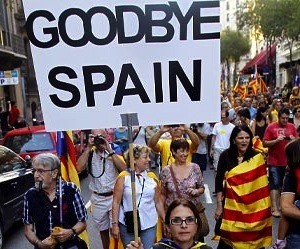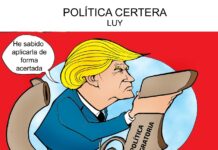Peter Fieldman
I have to admit that as a British citizen living in Spain I have never fully understood the political conflict between Madrid and Barcelona, which has been simmering for decades. After all, Spain is already a mini European Union on its own with seventeen regions each with considerable autonomy and freedom to manage their affairs.

So why is a significant percentage of the population of seven million people living in the north eastern part of the Iberian Peninsula so intent on independence and the creation of a separate state?
The illegal referendum, declaration of independence, the introduction of article 155 and the exile and/or imprisonment of its leaders, do not seem to have discouraged the Catalan nationalist electors who obtained a narrow victory in the regional elections. But has anyone asked the nationalists what they expect to gain from what would be a dramatic and unprecedented transformation of their lives?
Whenever I hear about the Catalonian people I take it as expression of origin in the same way a person might claim to be a Londoner, Parisian, Neapolitan or Californian. The people living in Catalonia have Spanish passports and speak Spanish and, from what I have seen during numerous visits, possess an identical culture. No foreigners visit Catalonia. When they go to to Barcelona, they are visiting a major Spanish city; when they take vacations on the Costa Brava or ski in the Pyrenees, they are on holiday in Spain; when corporations negotiate with companies in Barcelona they are dealing with Spanish businesses.
Historically I find no evidence that a Catalonian nation ever existed. The region was occupied by the Romans and Moors. During the middle ages it was part of the kingdom of Aragon but was never a separate nation state unlike Scotland, with which it often tries to compare itself, which has been a nation for more than 700 years with a monarchy and its own laws and is part of the United Kingdom. A police officer in Los Mossos D’Esquadra, the Region’s police authority, confided in me that the majority of Catalonians are not nationalist but have been drawn towards the nationalist parties due to the intransigence of the Spanish Government over granting the region more autonomy.
After the death of Franco, Catalonia in fact voted for the Spanish Constitution in 1978 and has always maintained a regional parliament with considerable powers of autonomy as well as an official Catalonian language. Nevertheless I find it disrespectful and unnecessary that Catalonian politicians insist on speaking their local language rather than Spanish when being interviewed by the Spanish media.
Coupled with Brexit, the illegal and unconstitutional referendum and declaration of independence is another unwanted challenge for the European Union exacerbated by Puigdemont’s presence in Brussels. The EU can never condone such a move as it would open up a pandora’s box of every region with similar claims: Belgium is divided between its Flemish and French speaking regions, in Italy the Lombardy and Veneto regions recently organised a referendum for more autonomy while Corsica is constantly at odds with the French Government over its political status.
Whatever was Puigdemont thinking when he declared Catalonia an independent state? He must have known the consequences of such an act of treason, which until the beginning of the twentieth century would have resulted in decapitation or a firing squad in the main square. Puigdemont’s call to the rest of the world for recognition of a Catalonian state was met with silence since it is unlawful. Despite Rajoy relying on the law and the constitution it has not prevented Catalonian nationalists calling the Spanish Government anti democratic and declaring that Puigdemont and his counsellors, who were arrested, are political prisoners. Support for the Catalonians came from Venezuela which is hardly qualified to judge human rights issues.
By fleeing Spain, leaving his fellow conspirators to face justice, all credibility in Puigdemont as a leader must have been lost. His vision of a separate nation state seems contradictory. He declared on Belgium TV that he was able to travel to Brussels thanks to the freedom of movement within the EU and the global world in which we live. Yet he wants to push Calalonia, a coastal and mountainous region locked between France and Spain economically prosperous and speaking a language, which nobody else in the world uses or understands, back to the middle ages.
In the global economy Puigdemont’s rash decision has sparked fear into many major corporations and financial institutions which do not share his vision who have moved or are planning to transfer, their headquarters to other parts of Spain. Although any new European State can apply for EU membership, Catalonia would initially cease to be a member of the EU requiring the reintroduction of frontier and trade barriers. It would no longer be in the Eurozone thus requiring a Catalonian currency.
Barcelona would likely see a swift decline in its vital port activities as container ships could easily divert to Valencia, Algeciras or Marseille to remain within the EU. It would affect the programme for the rail link from France through Barcelona to Valencia and Algeciras while border controls would mean motorway tail backs at the French border reaching Perpignan and Girona. And has he given any thought to the 50 % or more of the people living in Catalonia who wish to remain Spanish? What would be their situation in a Catalonia which presumably would have to issue their own passports and ID cards and instigate new social security, pension plans and employment laws?
The Catalonian leaders call for the right of the people to choose their future. But where does the “right to decide” of a people stop? If Catalonia can unilaterally declare itself a State then so could the Valley of Aran in the Pyrenees, which wishes to remain Spanish. Perhaps Barcelona would choose to secede from the rest of Catalonia etc. etc. On a sporting note would “La Barca”, one of the world’s most successful soccer clubs, relish playing in a Catalonian league against opponents like Vic, Figueras, Palamos, Manresa or Granollers? In a changing world, a separate Catalonian nation is simply inconceivable and unrealistic.



